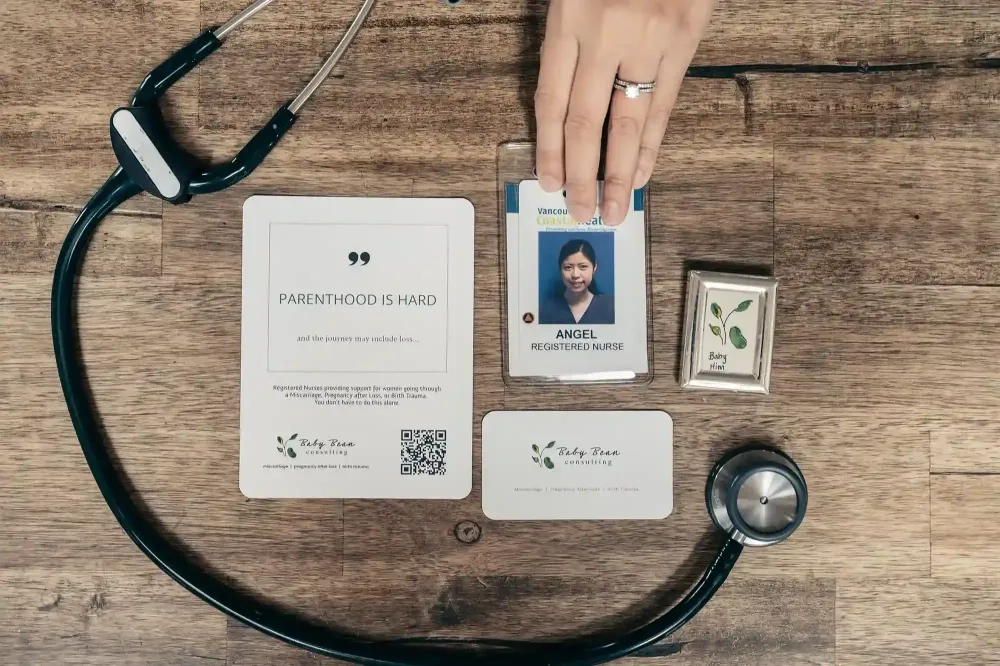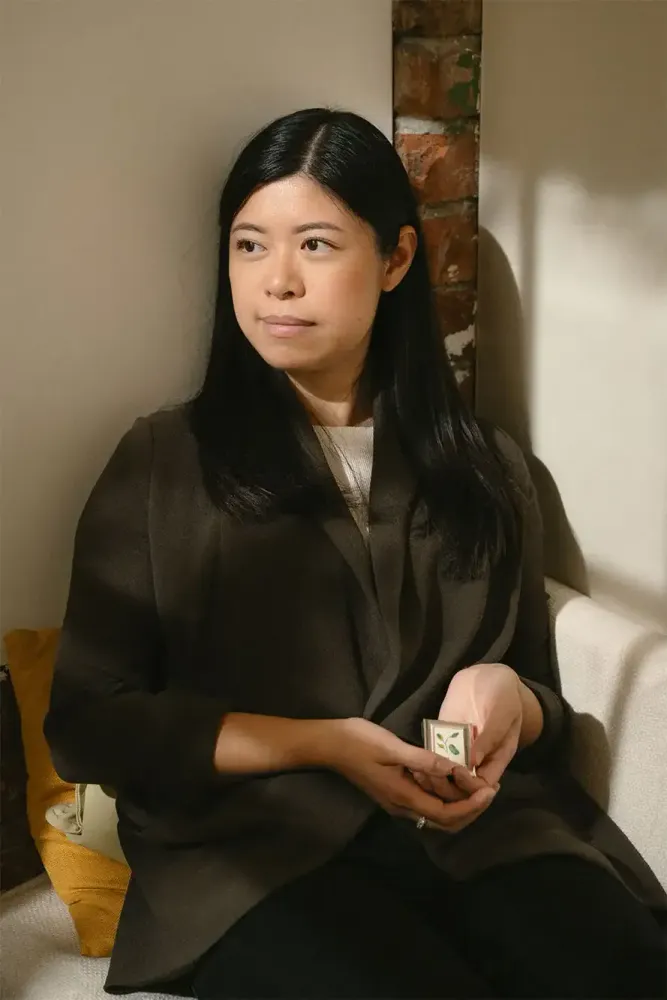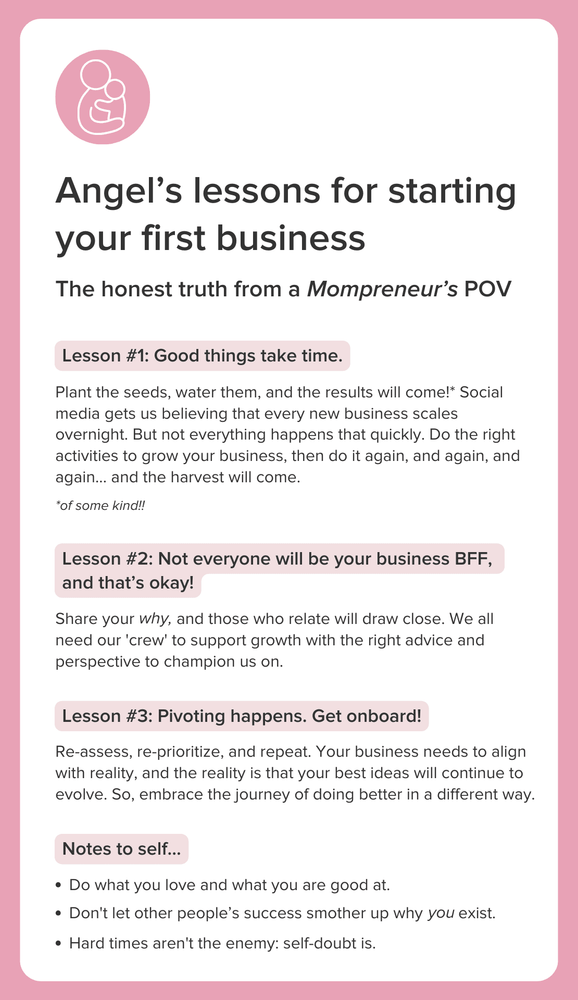How Baby Bean Consulting is Innovating Women's Healthcare
Miscarriage, pregnancy after loss, and birth trauma are often not talked about enough, leaving women and families to navigate some of life’s most challenging seasons without support.
We spoke to Baby Bean founder Angel Leung about how her personal story inspired her to innovate in women’s healthcare, break down misconceptions, and fuel much-needed change.
Angel Leung is no stranger to the Canadian healthcare system.
She has worked as a registered nurse for over a decade, drawn to helping babies and families in the neonatal intensive care unit at BC Women’s Hospital in Vancouver.
Then, unexpectedly, Angel became a patient. She and her husband went through a miscarriage. “I was heartbroken and lost,” Angel recalls.
Though they eventually welcomed two healthy children, Angel and her husband would experience pregnancy loss twice more while trying to grow their family. Each time, the emotions of that first loss would come rushing back.
“As a registered nurse, I felt like I should know what to expect,” Angel says. “I should know how to navigate the healthcare system, and I should know how to get connected to the appropriate resources. But as a patient, I didn’t. I didn’t have that mental capacity, I didn’t have the physical ability, and I was just so deep in my grief that it felt impossible to figure everything out on my own.”

It became clear to Angel that the Canadian healthcare system was more reactive than proactive — and that she wanted to change the system for the better.
“We’re so fortunate that we do have resources and support available, but a lot of the onus is on the patient to actively advocate for themselves,” she explains. “[They] need to be able to articulate their medical needs so that they can be connected to the right resources.”
That realization kept running through Angel’s mind.
How could she use her training to help women access the care they needed, especially at one of the most vulnerable times in their lives?
Becoming an advocate for women's healthcare
Even with excellent doctors, and intimate knowledge of healthcare from her own training, Angel still faced hurdles.
Available services had long waitlists, referrals would take months, required diagnostic tests would take weeks more. Angel tells us: “I thought, ‘Okay, we have to do something.’”
Angel wanted women like her to feel empowered to advocate for themselves, their health, and their families.
And deep down, she knew that meant a career shift.
She took the risk of leaving her stable job — one with union benefits and years of seniority — to start her own business.
Baby Bean Consulting is a personalized service that focuses on three areas of support: miscarriages, pregnancy after loss, and birth trauma. As the company’s sole clinical practitioner, Angel uses her expertise to coordinate care and connect women to the appropriate resources.
At Baby Bean, Angel asks every client: ‘‘Where in your journey do you feel like you’re lacking support?’ And that’s where we come in to make sure that gap is filled.”
For some people, that might look like referring them to a physical therapist for pelvic floor therapy. For others, it might be a mental health counselor.
“We have a lot of moms who are now anxious, nervous, and scared. They’re not trusting of the healthcare system because of their own experience,” Angel explains.
She remembers wishing a healthcare professional had checked in on her: “If someone had just taken the time and said, ‘Angel, I know how hard this is for you… do you want to talk about it?’”
Empathy is at the heart of her business model. Angel actively listens to her clients’ experiences, needs, and goals before helping them figuring out the best course of action for them.

Planting the seed of Baby Bean
In May 2024, Baby Bean officially celebrated one year in business. It’s a surreal milestone for Angel, who has poured her heart into every detail. And it all started with the name.
“My very first miscarriage, we had nicknamed our baby ‘Baby Bean.’ And one of my really close friends, when we lost Baby Bean, she took the time and effort to search how to honor someone’s miscarriage and their baby. She’s an artist, and she decided to paint me this beautiful picture, and that’s the logo we use now for Baby Bean
Consulting.”
That logo — a watercolor of a plant that is starting to sprout up from the ground, with a tiny bean beside it — inspired Angel’s whole marketing aesthetic.
The copy on her website is equally intentional, inspired by what Angel wishes she could have read as she went through her losses.
“I remember clearly thinking when I was at that point, ‘Is there someone I can just talk to where they could just hold my hand and help me feel less alone?’ So that translates to our website, where [we’re saying]: let us help you understand what’s happening to your body, and that all your feelings and emotions are valid, and it’s okay.”

With their unique voice and the services they offer, Baby Bean is in a league of its own. Angel says: “We’re offering a service that does not exist. There [are] no other providers out there doing exactly what we’re doing. So we’re very unique. We’re very niche, and we’re also trailblazing.”
But that also brings its own set of business challenges. “What should we set as our pricing? And the uncomfortable questions like, ‘Well, what’s my time worth? What’s my expertise worth?’ That was a hard conversation to have, but it also was a really needed one.”
Angel took time to consult with a range of healthcare providers — such as clinical therapists, massage therapists, physical therapists, doulas, and midwives — to get a full picture of what the industry standard was for private practice.
“And then we also have to consider the fact that registered nursing care is covered, or it can be covered, by people’s insurance. So how can we make it accessible for those who do have insurance coverage? Our pricing has to be at a point where it actually works [and] it’s beneficial to them, so they can tap into their insurance coverage.”
Setting the standard for women's healthcare
Looking ahead, Angel has her sights set on doing more outreach in the community — namely, more workshops in corporate settings with Human Resources and People & Culture teams.
She hopes to support whole family units going through difficult fertility journeys, encouraging their employers and insurance partners to treat the experience like any other form of employee wellness and health support.
A lot of progress has been made in workplace mental health over the last ten years, Angel notes. She has the same hope for fertility journeys, too, and wants to set the standard.
When Angel speaks with business leaders, she asks: “What if your employees are going through losses? They’re going through treatment failure. They’re going through infertility struggles. Maybe you want to be the industry change leader to support families going through that.”
When it comes to pricing workshops for employees going through fertility issues, Angel’s looked at affordability, too.
“We are very intentional [about] anything that is geared towards the public. We make it more accessible and affordable, and make sure that part of the funding can go towards helping support clients who might not be able to afford our services,” Angel says.

Getting the word out
Over the last year, Angel has worked to get the word out about Baby Bean. She’s also completely honest that getting their name out there has taken time.
For Angel, that reality has looked like a year to truly gain momentum for her business. She’s done a lot of active outreach, including joining a local healthcare network called Pathways BC — an online directory that British Columbia doctors often use to refer patients.
“Sometimes you connect with people, you reach out, you make these wonderful relationships, connections, calls, and people are excited about what you do. But sometimes that momentum dies,” Angel explains. “Sometimes things slow down, or you don’t actually get any traction from an event that you thought was so successful. I think the truth is that, especially in healthcare, change is hard to embrace.”
Her advice to practitioners thinking about going down the entrepreneurial path: “If you’re setting out to do a business that you are passionate about, and you see the value, and you know why you’re doing it, then I think you can only ride on that wave and keep going.”
Even though Angel is looking ahead to new possibilities and growth, she’s also staying firm in Baby Bean’s mission. Her goal is to make sure that every woman is able to advocate for themselves as they navigate their journey to motherhood.
“The goal is still the same as if we launched just yesterday, right?” she says. “We just want to reach women more readily and in a more timely manner, so they don’t have to Google to find us. That their doctors would tell them about Baby Bean. Their midwives. Their mom, their sister, and their best friends would tell them about it. That’s the big goal.”
Angel reflects on her whole journey — from the emotional rollercoaster she and her husband endured, through to the first seed of an idea with Baby Bean’s logo, and to the impact she’s making with her current clients.
“We’ve already planted many, many seeds in the sense of building relationships, both in the medical world and the corporate world, and with the general community and public,” she says. “And my goal, moving forward, is to continue to nurture those relationships to hopefully inspire real change.”
Angel's lessons for starting your first business


